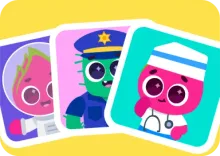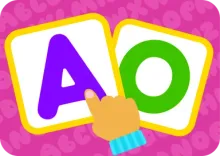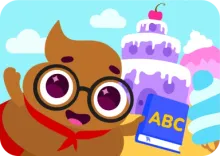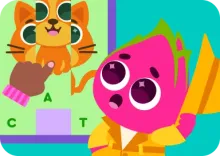Acting Games for Kids – Developing Creativity, Self-Confidence, and Social Skills
Acting games encourage children to explore emotions, imagination, and expression through playful performance. These creative activities help build confidence, communication skills, and social interaction while making learning fun and engaging for kids of all ages.
Table of contents
- Creative benefits of acting games
- Why acting benefits kids at any age
- Acting Games by Age
- Acting Games for 1-2 Year Olds
- Games for Children 3-4 Years
- Acting games for preschoolers (5-6 years)
- Outdoor Acting Games
- How Digital Acting Games Help Kids?
- Practical Tips for Parents: How to Make Games More Interesting and Safe?

Creative benefits of acting games for kids’ development
Theatrical games are a powerful tool for child development that goes far beyond simple fun. Acting games for kids help them explore the world of emotions, develop self-confidence, and improve social skills. Through play, little ones learn to express themselves, overcome shyness, and understand how to interact with others. They can try on different roles – from a fierce lion to a shy princess, and this helps them better understand the world around them.
In this article, we'll examine why you should encourage your child's ability to transform into different characters, which games work best for this, and how to approach preparing such activities.
Benefits of acting for kids: Why They're So Important at Any Age?
Theatrical games improve concentration, attention, and learning ability, and are also the foundation for many other skills.
- Development of emotional intelligence. Theatre games give children the opportunity to try on various roles and explore a wide spectrum of emotions. This helps them better understand their feelings and others' feelings, developing empathy. For example, when a child plays a sad character, they learn to recognize and name this feeling. Acting games also help develop emotional intelligence, which is a key skill for successful life.
- Improvement of speech skills. When children try on roles of different characters, they use new words and phrases, which enriches their vocabulary and improves articulation. Theatre games for kids stimulate them to engage in dialogues and monological speech. They learn to build sentences, express their thoughts and feelings, without which communication is impossible.
- Increasing self-esteem and confidence. Performing in front of others, a child learns to overcome stage fright and shyness. When their role is recognized, their confidence grows. Even the simplest drama games for kids can help shy little ones open up and feel more comfortable in a group.
- Training concentration and attention. To successfully play a role, a child must fully immerse themselves in it and follow other participants' actions. This excellently trains perseverance and attention, which is an important skill for school. The benefits of acting for kids include improving the ability to focus on one task.
- Strengthening social skills. Theatre games are always group activities where children learn to work as a team, listen to each other, and negotiate. They learn to respect others' ideas and jointly create something new. This is an excellent way to develop communication and cooperation skills that will serve them in the future.

Help your child
grow with Keiki
We’ll help you turn everyday screen time into real learning progress.
Try KeikiActing Games by Age – Which Option Will Be Most Suitable?
For a game to be truly useful and interesting, it must be selected based on the child's age, interests, and development level.
Acting Games for 1-2 Year Olds
At this age, games should be simple and based on facial expressions and sounds. The goal is to gently introduce them to the world of creativity, show the advantages of self-expression, and prepare for more complex challenges in the future.
Mirror
Sit facing the child and start depicting different emotions: joy, surprise, sadness. Ask them to repeat after you. This way you can develop fine motor skills and give basic understanding of emotions. Early imitation of adults through simple drama games for toddlers with proper workload also triggers toddlers' speech.
Act Like an Animal
Ask the child to portray their favorite animal, for example, a roaring bear or hissing cat. This game develops imagination and body motor skills.
What Am I Eating?
Pretend you're eating something delicious, then something sour. Ask the child to repeat. Using facial expressions, the little one learns to express emotions and generally deals with different reactions (including negative ones).
Show How I Do
Make simple movements, for example, clap your hands, then ask the child to repeat. This game trains attention and memory.

Help your child
grow with Keiki
We’ll help you turn everyday screen time
into real learning progress.
Games for Children 3-4 Years
At this age, children can already understand more complex acting games for toddlers requiring multiple players.
Silent Story
One child starts a story using only gestures. Another must continue using their gestures. You can dance, express emotions with facial expressions, generally do anything except speak words aloud.
Sound Story
Another improvisation games for kids, similar to the previous task, but now the little one uses only sounds to tell a story. For example, "boom" (fell), "woof-woof" (dog), "beep-beep" (car). This develops auditory memory.
Guess Who I Am?
One child portrays some character or animal, while others must guess them. Such acting exercises for kids work on developing creativity and mastering pantomime.
Fashion Show
Children can try on different outfits and organize their own show. This develops their imagination and sense of style, and also helps them feel more confident.
Help your child thrive with playful learning
Turn screen time into real growth with Keiki’s educational games.
Try KeikiActing games for preschoolers (5-6 years)
Games become more complex and can include more objects or longer sequences.
Shadow Theater
Using a flashlight and simple objects, you can organize a real shadow theater, acting out your own stories. This approach develops creative thinking and ability to work with space.
Living Picture
Children must portray a famous painting or scene from a book using only their bodies. This develops their spatial thinking and ability to work as a team.
Interview with a Hero
One child plays the role of journalist while another plays the role of a fairy tale or cartoon hero. This develops speech skills and ability to conduct dialogue.
Improvisation
Improv games for kids are very important, they stimulate imagination and resourcefulness well. Give little ones an unexpected situation, for example, "what to do if aliens attack you?" They must figure out what to do using their imagination. To complicate the task, make it a competition with time counting (for example, one minute per answer for each participant).

Outdoor Acting Games
Simple drama games for toddlers outdoors open new possibilities and allow using the natural environment as one big stage for performances. We've selected several interesting ideas for entertaining little ones outside.
Jungle Journey
Players portray travelers in the jungle. They must show how they make their way through dense thickets, jump over streams, fight off wild beasts. This not only adds interesting moments to acting talents but also develops physical endurance.
Treasure Hunt
One player hides treasure and draws a map. Other players must portray heroes searching for treasure and act out scenes they encounter on their way (for example, crossing a river or climbing a mountain).
Wizard School
Suggest children turn sticks into magic wands and act out scenes from magic books. They can create their own spells and movements. You can add a competitive element, for example, for the most beautiful spell or wand movement.
Ship Captain
Players become the ship's crew. They must follow captain's commands: raise sail, drop anchor, steer the wheel. Let little ones show how they do this with gestures or taking stones, sticks, and other things around as props.
How Digital Acting Games Help Kids?
Digital acting games offer an interactive and engaging way to train imagination and creativity. They can complement traditional games and motivate children to learn. You might ask, but how is improvisation or acting possible in an online environment? We answer: through developing useful skills needed for children's theater or performances. Keiki contains various games that help with this:
- Conversationalist. A ready trainer simultaneously for speech training and acting games, as the little one can also pronounce words and sentences in different voices. But they must invariably do this clearly, practicing correct pronunciation. Need we say that such speech training games are also important in acting, performances, simply in knowing how to carry oneself in public? Thanks to them, children learn not just to communicate or express thoughts, but to do so clearly from early years.
- Short Stories. Real creative development for kids, with which you'll have not just reading lessons in your arsenal. Such reading learning games also teach speaking, expand vocabulary, and stimulate imagination. Many scenes from there can even be staged on an improvised stage.
- Speaking Cards. The ability to transform and play roles directly depends on speaking skills. These are two sides of the same coin that complement each other. Keiki has special cards that can be used to improve both skills.
Online acting games can be an excellent tool for developing creative skills as they offer endless options, bright visual effects, and sound accompaniment. They can be especially useful for little ones who prefer interactive activities. Keiki offers safe and educational games that develop emotional intelligence and other useful skills.
Related Games in Keiki App
Practical Tips for Parents: How to Make Games More Interesting and Safe?
For games to become part of life, to bring pleasure and not just benefit, you need to approach organization wisely and make them part of routine. Here are several practical tips:
- Let activities become celebrations. This is simpler than it seems. Organize theatrical evenings with the whole family once a week or more often. Let performances or charades for kids become something special when parents and relatives are involved in the process, act as audience and main fans, show they eagerly await these moments.
- No phones or distracting factors. Except, of course, for moments involving free acting games for kids that require gadgets.
- The younger the children, the shorter performances should be. However, if they're genuinely engaged, let them finish what they started. Conversely, if you see they're not in the mood today, are distracted and don't want to play, don't turn it into torture.
- Use everyday objects. For games, you can use everything you have at home: old scarves, boxes, blocks. You can also make decorations from simple things: stage, props. Cardboard or old boxes, some paints and glitter work perfectly for this.
Remember that acting exercises for kids are not only a development tool but also entertainment where all participants should have fun.















